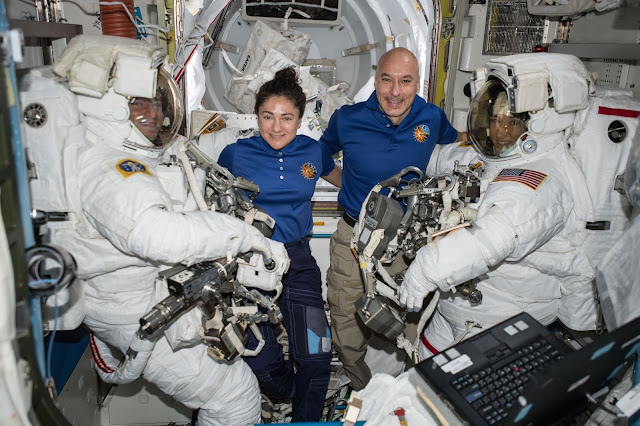ESA - Beyond Mission patch.
10 October 2019
European Space Agency (ESA) astronaut Luca Parmitano is preparing to step out into space for his first spacewalk of the Beyond mission.
ESA astronaut Luca Parmitano assists spacewalkers in the Quest airlock
Scheduled for 25 October, he will work with NASA astronaut Jessica Meir to replace nickel hydrogen batteries with newer lithium ion batteries and install battery adapter plates on the Space Station’s Port-6 truss structure.
This is a process fellow ESA astronaut Thomas Pesquet knows well, having replaced batteries on another power channel during his Proxima mission. We asked him to tell us more about the task and how the crew will prepare.
The lead-up
Known to the crew as an EVA (Extravehicular Activity), each spacewalk is planned up to a year in advance.
Thomas Pesquet spacewalk test
On Station, preparation begins around two weeks ahead, with a set of procedures called the “Road to EVA”.
“Preparing for a spacewalk will make up 2-3 hours of your schedule every day during this time,” Thomas explains. “The crew often carry out prep in their personal time as well.”
The big day
Live coverage of Luca and Jessica’s spacewalk starts on NASA TV at 10:30 GMT (12:30 CEST), but the crew will begin their preparation around 6:00. And there is to be no showering, shaving, or applying deodorant for at least a day in advance, as any remnants of these products could mix with the pure oxygen inside the suit and pose a fire risk
Astronauts wear a liquid cooling garment underneath their spacesuit. This is connected to the water system that keeps them cool, or warm, by circulating water around their body. They also don a medical monitor and put a dosimeter in their pocket to measure radiation before entering the hatch.
EMU spacesuit
Thomas describes the process inside the airlock as “like scuba diving in reverse”, as astronauts breathe in a controlled way to rid their blood of nitrogen and adjust to lower pressure.
A third crew member, known as the Intravehicular (IV) crew member, is also isolated in the airlock, before it goes to vacuum. This person helps the astronauts with their oxygen masks and into their spacesuits, while making sure everything is checked, tethered and ready for a safe and successful sortie.
It is a role Luca will play in the two spacewalks before his, on 15 and 21 October.
Out in space
Before exiting the airlock, Thomas says, extreme focus is the overriding feeling.
“Everybody’s watching, so many people have been involved in the preparation, and the risks are so much higher when you’re outside the Space Station,” he explains. “The only thing you can’t really prepare for are the day/night cycles.
“During the night, you only have your helmet light, so you can’t really see anything except what you’re working on. And because you’re working in all body orientations, it’s easy to get disoriented. But you know you can always follow your tether back towards the hatch.”
Luca Parmitano training at NASA’s Johnson Space Center
After exiting the airlock, Thomas says one astronaut will prepare the worksite while the other breaks torque on the pre-positioned adapter plates. Each astronaut will then work to install the adapter plates, needed to replace two older batteries with one new one.
The spacewalk on 25 October is the one of five scheduled for October. Even more are expected in November as Luca ventures out again with the complex task of repairing and enhancing dark matter hunter AMS-02 – a structure never designed to be maintained in orbit.
Related links:
Truss structure: https://www.nasa.gov/mission_pages/station/structure/elements/truss-structure
NASA TV: http://www.nasa.gov/nasatv
Human and Robotic Exploration: http://www.esa.int/Our_Activities/Human_and_Robotic_Exploration
Beyond mission brochure English: http://esamultimedia.esa.int/docs/HRE/Beyond_interactive_EN.pdf
International Space Station (ISS): https://www.nasa.gov/mission_pages/station/main/index.html
Images, Text, Credits: ESA/S. Corvaja/NASA.
Best regards, Orbiter.ch





